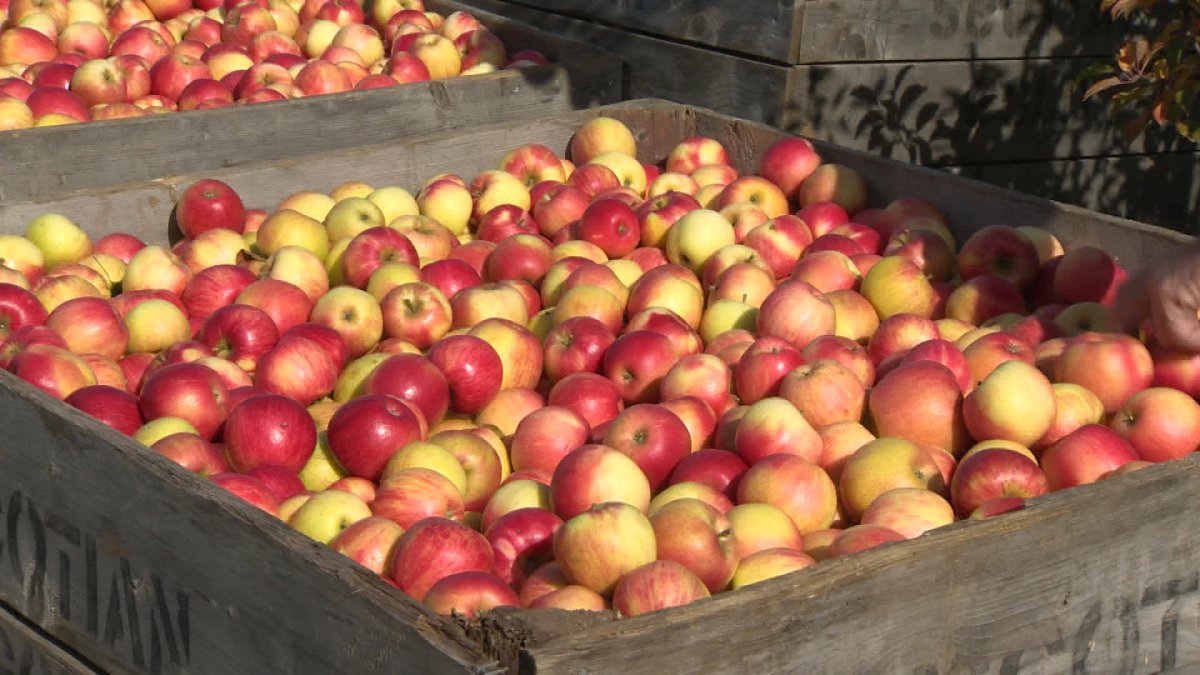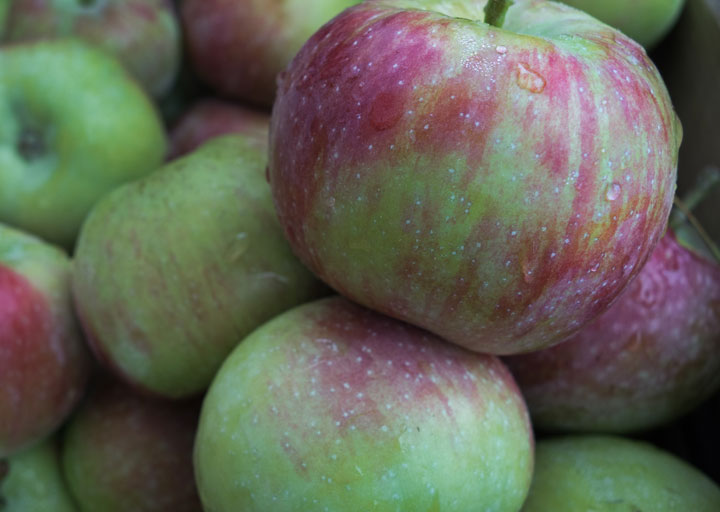TORONTO – When you go to the grocery store and pick up a shiny apple, have you ever wondered why it looks so perfect?

It’s because farmers spray non-organic apples in a coating to help eliminate any of those unsightly, natural brown spots that creep up when apples are stored, called scald. And the European Union believes that at least one of the chemicals — diphenylamine, or DPA — is potentially harmful to our health.
It’s not the chemical itself, according to the EU. It’s a byproduct of DPA that occurs when it breaks down, called nitrosamines. It has long been known that nitrosamines are a carcinogen. It has banned the import of any apples containing DPA of over 0.1 parts per million (ppm) which began in March.
Apple producers in both Canada and the United States use DPA on non-organic apples. In Canada, its use on apples is 0.42 ppm.
“It’s not used on all varieties,” Jennifer DeEll, who leads a quality control program for the Ontario Ministry of Agriculture and Food, told Global News. “Within North America, it’s still allowed up to 5 ppm.”
The Pest Management Regulatory Agency, a division of Health Canada, has initiated a special review of 23 active ingredients, one of which is DPA.
When asked how long the review would take, Health Canada said in a statement to Global News, “Diphenylamine is currently under special review based on the European Union decision. During the special review, Health Canada will assess the concerns identified in the European decision. Once the assessment is completed, the proposed decision will be published for consultation before making a final decision.”

Get weekly health news
The apples that are affected are some of the most popular: red delicious, Courtland, Macintosh and empire, just to name a few.
Just how this will affect Canadian apple growers isn’t clear yet. But it will have an effect.
Tom O’Neill, general manager of the Norfolk Fruit Growers’ Association in Ontario said that, typically, each year they export about 35 containers of apples to the United Kingdom. Each container has 1000 cases in it.
“This year, all we were able to export was two containers,” O’Neill told Global News. Those containers were the only untreated fruit they had.
But for O’Neill the immediate response to the ban isn’t eliminating DPA.
“The risk of scald is something we haven’t had to deal with for a long, long time. But you could lose a significant portion of your crop to scald, if you’re not able to protect it, which DPA does,” O’Neill said.
“We’re going to have to look for different markets, as opposed to supply the EU.”
On a financial level, the inability to supply the EU with apples could be costly. O’Neill said that each container brings in about $27,000. Spread out over 35 containers, it’s $945,000.
According to Statistics Canada, fresh apple exports totalled 25,969 metric tonnes in 2010, accounting for $24.6 million. Most of the exports were from British Columbia ($12.8 million) and Ontario ($6.4 million). Most of B.C.’s exports (about 75 per cent) go to the U.S.
But the U.S. Environmental Protection Agency doesn’t feel that the European Union’s findings are accurate. When contacted by Global News, the EPA said this in a statement:
“…Although it has been reported that the European Union did not have sufficient information to confirm the safety of DPA-treated apples, in the U.S we did have sufficient information to make a safety finding.”
The EPA also directed Global News to its findings, which said:
“DPA generally is of low acute toxicity and has been classified as ‘Not Likely’ as a human carcinogen. An impurity of DPA, diphenylnitrosamine, is classified as a ‘probable human carcinogen,’ however the cancer risks for dietary intake and worker exposure fall below the Agency’s level of concern. Food crop use consist of post-harvest use on apples. Dietary exposure to DPA residues in foods is within acceptable limits.”
The EPA said that “diphenylamine is scheduled to be examined in our ongoing registration review program which ensures that pesticides do not cause unreasonable risks to human health, workers or the environment. However, if at any time we receive new data about risks posed by a pesticide, the agency will move quickly to take appropriate regulatory action.”
In the meantime, Canadian apple exporters will have to find some other way to make up the thousands of dollars lost in revenue from the European market.
“You need to find someplace else, either in Ontario, Canada or someplace else in the world, other than the EU to sell that fruit,” O’Neill said.



Comments